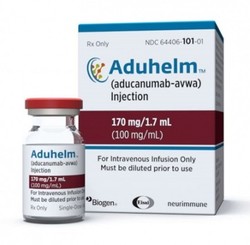Biogen's Alzheimer's drug Aduhelm (Ingredient: Aducanumab), which has recently received approval from the U.S. Food and Drug Administration, may soon be available in Korea.

According to industry sources, the company's Korean offshoot recently applied for the approval of Aduhelm to the Ministry of Food and Drug Safety.
Aducanumab is an Alzheimer's disease drug approved by the FDA for the first time in 18 years. It is the first drug to target beta-amyloid, an amino acid peptide involved in the disease. Aduhelm received conditional approval from the FDA on June 7 on the condition that it proves clinical benefit in confirmatory clinical trials.
The U.S. regulator has determined that the therapeutic benefits of Aduhelm outweigh the risks for patients with Alzheimer's disease. However, Aduhelm did not meet the primary endpoints in the EMERGE and ENGAGE trials. Accordingly, in November last year, the FDA advisory committee advised not to approve the drug due to insufficient evidence to prove its effectiveness.
However, Biogen applied for approval to the FDA based on further analysis of clinical data to prove its effectiveness in the high-dose group and received approval.
Even since the U.S. agency approved after twists and turns, controversy has persisted.
Critics said the FDA set the indication for a treatment that showed effect through a surrogate indicator, beta-amyloid, for all AD patients regardless of the causative mechanism. Although AD patients in the clinical trials of Aduhelm were in the early stage of the disease, the FDA had allowed it for all stages of AD, they noted.
Later, three FDA advisors who opposed the approval recently resigned, further fueling the controversy over the adequacy of the approval. The FDA has also recently asked the Office of the Independent Inspector General (OIG) to investigate the Aduhelm approval.
Amid lingering concerns, the FDA also revised the label of Aduhelm, reducing the number of people eligible for the treatment last Thursday.
The regulator added the information in the label that Aduhelm should be used for "patients with mild cognitive impairment or mild dementia stage of the disease."
Previously, the FDA had granted indication for Aduhelm in treating Alzheimer's disease. However, the updates reflected that Biogen's trial only used the therapy in patients with mild symptoms in clinical trials and aimed to limit the prescription of the drug.
Against this backdrop, the Ministry of Food and Drug Safety will also likely undergo extensive discussion before approving Biogen's drug.
The Korean regulator has provided advantages for new drugs approved by its advanced foreign counterparts, such as the FDA and European Medicines Agency, and granted approval to most of them without difficulty. However, industry officials predicted that it might be different for Aduhelm, pointing out that even the FDA raised uncertainty about efficacy.
"I think the FDA approved aducanumab as it was a drug developed in the U.S.," an industry executive told Korea Biomedical Review, asking to remain anonymous, on Friday. "The company may obtain different results for its permit application in Korea."
Even after obtaining approval from the Ministry of Food and Drug Safety, Biogen will also have to apply for reimbursement of the drug to expand coverage.
Biogen has set Aduhelm's list price at $4,312 per infusion for a patient of average weight, or $56,000 per year, in the U.S.
With such a high price tag, it is unclear how many patients will pay for a drug that has not cemented its efficacy without reimbursement, the industry official said.
Meanwhile, Biogen is conducting a phase 3b clinical trial for Aduhelm in Korea.
The trial aims to confirm the efficacy of the treatment in 41 patients. Patients will receive 26 doses once a month until August 2023.

